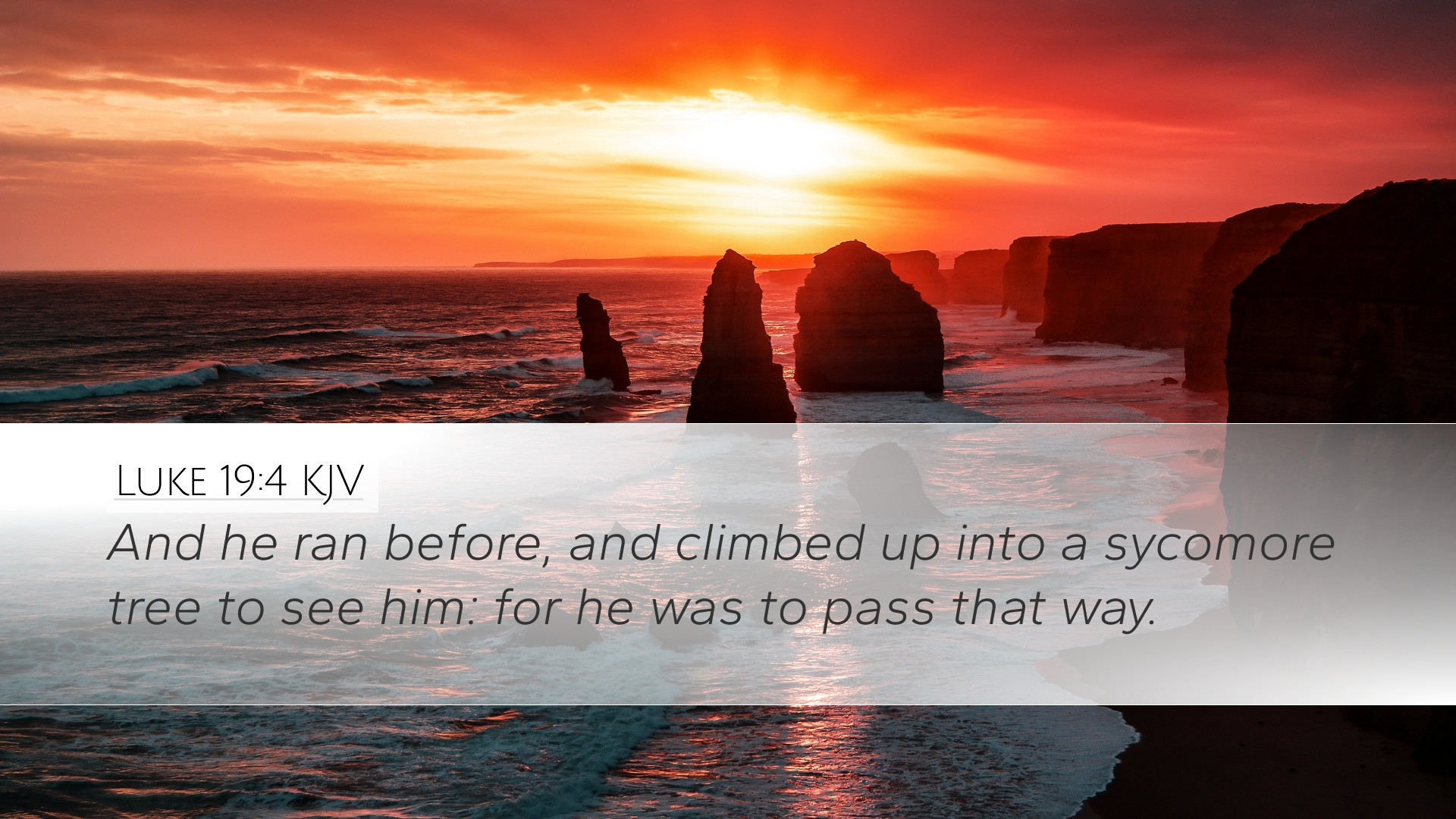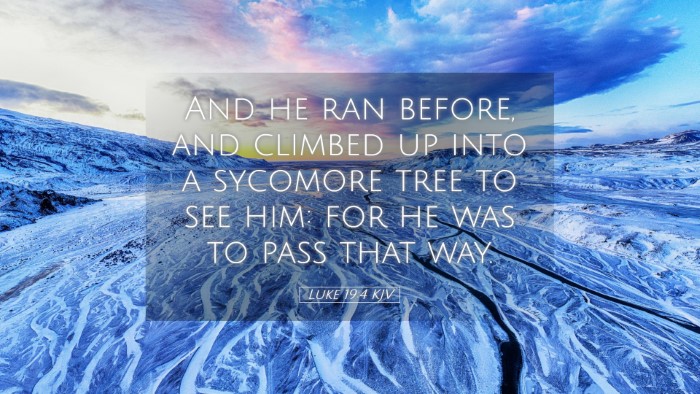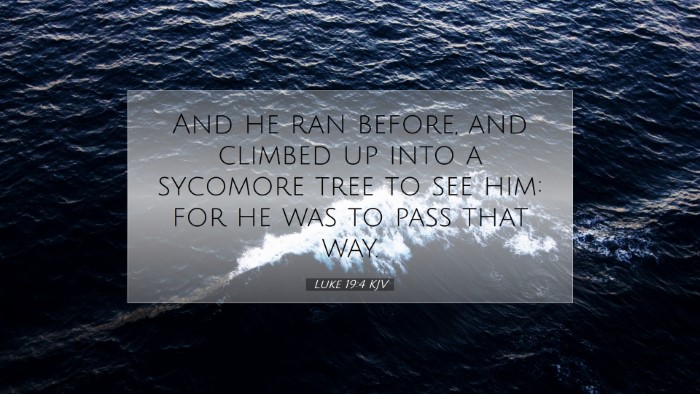Commentary on Luke 19:4
Luke 19:4 states: "And he ran before, and climbed up into a sycamore tree to see him: for he was to pass that way." This verse presents a significant moment in the life of Zacchaeus, showcasing his determination and desperation to encounter Jesus. The commentary on this passage draws insights from various public domain authorities, including Matthew Henry, Albert Barnes, and Adam Clarke.
Contextual Background
The Gospel of Luke frequently highlights the theme of Jesus' outreach to those ostracized by society. Zacchaeus, a chief tax collector, embodies this theme. His position placed him on the margins, both socially and spiritually. The narrative of Zacchaeus' climb up the sycamore tree is not merely a historical account but serves to illustrate deeper theological truths concerning humility, repentance, and the transformative power of Christ.
Matthew Henry's Insights
According to Matthew Henry, this passage symbolizes the zeal with which Zacchaeus sought Jesus. He emphasizes that Zacchaeus did not allow his social status, or the crowds that might have dismissed him, to deter his pursuit. Henry notes that "he ran before, and climbed up into a sycamore tree," showcasing both urgency and eagerness. This action, while seemingly simple, is laden with spiritual meaning—a demonstration of how believers must pursue God with fervor.
The Sycamore Tree
Henry further elaborates on the significance of the sycamore tree in the narrative. The tree itself becomes a symbol of hope and elevation. In climbing, Zacchaeus transcends the limitations imposed by his stature—both physical and social. This act serves as a poignant reminder to all believers that they must be willing to elevate their pursuits in order to encounter Christ.
Albert Barnes on the Determination of Zacchaeus
Albert Barnes highlights the determination displayed by Zacchaeus in this passage. He points out that the act of running and climbing a tree was undignified for a man of Zacchaeus' status, yet it showcases his desperation to see Jesus. Barnes writes, "It is often the case that those who are most in need of divine grace will humble themselves, setting aside pride to seek what they cannot attain by standing still." This encapsulates the essence of true repentance and seeking healing from our spiritual maladies.
Preparation for Encounter
Barnes also notes that Zacchaeus not only intended to see Jesus but prepared himself for that encounter. The climbing of the tree indicates anticipation—it signifies a longing to elevate one's perspective. Barnes reminds the readers that "If we wish to see Christ, we must be willing to overlook the obstacles in our way." This necessary preparation emphasizes the active role believers must take in their spiritual journey.
Adam Clarke's Theological Reflections
In his commentary, Adam Clarke delves into the broader implications of Zacchaeus' encounter with Jesus. He discusses how the act of climbing the tree and the subsequent interaction represent a profound spiritual awakening. Clarke suggests that "the humility in Zacchaeus' actions contrasts sharply with the pride inherent in his former life as a tax collector." This underscores the transformational aspect of meeting Christ—changing one’s heart and actions in pursuit of holiness.
The Paradigm of Humility
Clarke expounds on the necessity of humility in the life of a Christian. He argues that climbing up, despite personal risk and public ridicule, reflects a heart turned towards God. "God resists the proud but gives grace to the humble," he writes, reminding readers that God often honors those who seek Him with sincerity and humility. This outward act of climbing becomes an inward expression of spiritual longing.
Theological Implications
Together, these commentaries illuminate the theological dimensions of Luke 19:4. The verse teaches us about the nature of repentance—it is not merely a feeling but an active pursuit of Christ, regardless of the obstacles standing before us.
- Pursuit of Christ: Zacchaeus' actions compel us to consider how actively we are seeking Jesus in our own lives.
- Humility and Transformation: The metaphor of the sycamore tree invites believers to acknowledge the need for humility in experiencing divine grace.
- Social Barriers: Zacchaeus breaks through societal constraints to find Christ, reminding current believers of the ongoing call to dismantle barriers in seeking God.
Conclusion
Luke 19:4 serves as a powerful reminder of the lengths to which one might go to meet Jesus. With insights from Matthew Henry, Albert Barnes, and Adam Clarke, this passage illustrates that true faith is marked by an eager pursuit of God, a willingness to embrace humility, and an understanding of the transformative nature of encountering Christ. As pastors, students, theologians, and scholars reflect on this verse, may they recognize the enduring call to climb the sycamore trees in their own lives, reaching out to see Jesus amidst the crowds.


